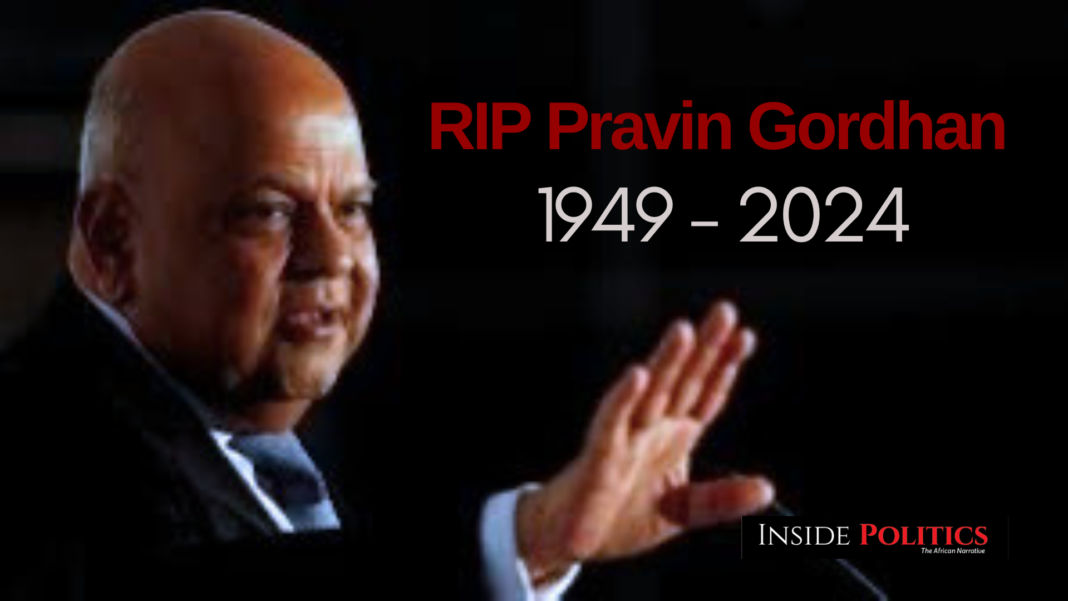By Thapelo Molefe
Hundreds of mourners gathered in Durban on Thursday to pay their last respects to the late former minister and struggle stalwart Pravin Gordhan.
He died last week after battling cancer.
The special official funeral category 2 was a testament to Gordhan’s significant contribution to South Africa’s democracy and his tireless efforts in fighting corruption.
As the morning sun cast its golden rays upon the gathering at Inkosi Albert Luthuli International Convention Centre, the mood was palpable, a mix of sorrow and gratitude.
Mourners from all walks of life, dressed in various hues of traditional attire and dignified formal wear, converged to honour a man who has left an indelible mark on South Africa’s history.
Tributes poured in from across the political spectrum, each echoing a similar message that Gordhan was a selfless leader, a steadfast advocate for justice and a beacon of hope in times of turmoil. His unwavering commitment to transparency and accountability inspired a generation of South Africans.
As the funeral service progressed, the eulogies painted a vivid portrait of a man who embodied the values of compassion, integrity and resilience. From his early days as a pharmacist to his later years as a Cabinet minister, Gordhan’s life was a testament to the power of conviction.
President Cyril Ramaphosa told the service that for all his achievements, Gordhan was at all times a humble human being and activist.
“It was his humility as a person and as a leader that made him great. It was his unwavering belief that a political activist must serve no other cause than the cause of freedom that made PG exceptional,” he said.
“Even as a Member of Parliament, even as a minister, at his essence PG remained a grassroots activist. He was one of those rare people who knew the cost of struggle. His activism earned him arrests, beatings and detention.”
The president described Gordhan, who was fondly known as PG, as key negotiator and astute tactician. He played an important role in South Africa’s peaceful transition to democracy and was one the architects of the Constitution.
“I will miss our many discussions over many hours, and the telephone conversations late into the night. I valued his frankness and forthrightness. I respected his opinions. And I appreciate that he always afforded me the same courtesy. He was my comrade and my colleague, but he was also a friend,” he said.
Former transport minister and anti-apartheid crusader Mac Maharaj praised his friend as a leader who never gave up when fighting for a worthy cause.
“This is an occasion to recognise some hard truths. The corrupt hurled everything at PG to rubbish a person’s identity. Neither that nor the abuse showered on him shook him. Pravin remained steadfast,” he said.
Maharaj said that Gordhan was a man of steel forged in a furnace.
“Without the exposures by the media, without the exposure and the fight back mounted by Pravin and his formidable team at Treasury, his deputy Mcebisi Jonas, Lungisa Fuzile and the SARS team, without them our beloved country could have become a banana republic governed by an autocratic regime adorned with a thick leaf of a hollowed out democracy,” he said.
Maharaj highlighted the significance his long-time friend played in exposing state capture and fighting against corruption.
He said Gordhan stood alone at one point, while others in the African National Congress who shared his views chose to remain silent.
Former deputy finance minister Mcebisi Jonas honoured the life and legacy of Gordhan and reflected on his commitment to the nation’s progress.
He highlighted his bravery, resilience and unorthodox approach to macroeconomics, which left an unerasable mark on the country’s economic landscape.
Jonas also acknowledged Gordhan’s instrumental role in fighting state capture and his tireless efforts to rebuild government institutions.
“The mandate seemed like an impossible task, trying to get monopolies in the state and in business to demonopolise themselves. It is almost like asking a lion to take [out] its teeth,” he said.
He said attempts to reform the country’s state-owned companies, even before the advent of state capture, suffered continuous setbacks.
“Everybody before Gordhan, even before state capture, tried and has been failing.
Meanwhile, many of those who were previously chanting our names to call out state capture were now either silent or critical of how the capture network was being undone in state companies,” Jonas said.
“So, anyone else, comrade Gordhan is right, anyone else would not have taken the poisoned chalice and Pravin did. And he did it very consciously”
Former chief justice Raymond Zondo highlighted Gordhan’s instrumental role in supporting the state capture commission’s efforts to uncover the truth.
Zondo said Gordhan was the first sitting Cabinet minister to testify before the commission. His bravery and perseverance in the face of harassment and persecution inspired many.
Zondo praised Gordhan’s humility, citing his willingness to return as finance minister knowing the challenges that lay ahead.
His commitment to fighting corruption was unwavering and he identified three key issues that needed to be addressed – SAA, SARS and the nuclear deal.
Zondo concluded his tribute with a call to action, urging South Africans to continue Gordhan’s fight against corruption and state capture.
“We have to pick it up and continue. Let us not end with singing his praises today… but decide on something to help fight corruption and state capture effectively.”
Gordhan’s daughter, Anisha, said: “My father is one of the few men who helped get South Africa out of the injustices.”
She said that he was one of the few courageous and honest souls who saved the country and its people from the brink of collapse.
In line with his Hindu beliefs, Gordhan was cremated at private ceremony attended by his family and close friends.
INSIDE POLITICS

